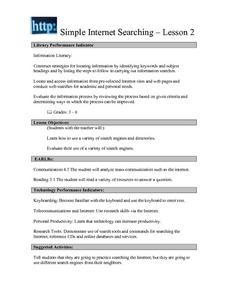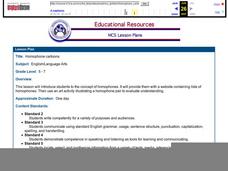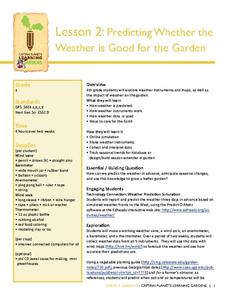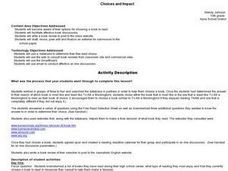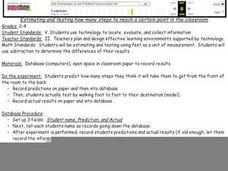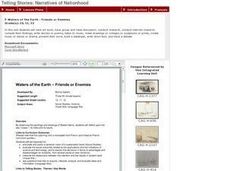Curated OER
What Are the Layers of the Rain Forest?
Students investigate the different levels of the rain forest by comparing it to an apartment. In this ecology lesson, students practice using forest related vocabulary words and complete a vocabulary data sheet. Students create...
Curated OER
Ecosystems Lesson Plan
Students research ecosystems (rainforest, desert, grassland, woodland, and arctic tundra). Students compare the seven continents and the importance of proximaty to the equator.
Curated OER
Simple Internet Searching Lesson 2
Learn how to use search engines and keywords! Learners evaluate the information process using given criteria and determine ways in which the process may be improved.
Curated OER
Mark Twain and Huckleberry Finn Introductory Lessons
“What is the role or function of controversial art? And, should children, our children, be required—forced—to study certain works they may find painful or humiliating or offensive?” Robert Zalisk’s question, found in his article, “Uproar...
Curated OER
The Talking Earth: a Research Lesson
Fifth graders read the book, "The Talking Earth" and research an animal that is found in the Everglades.
Curated OER
Planet Data
Sixth graders use various resources to locate information for a database (name of planets, diameter of planets, etc.). They enter the data onto a prepared data grid. Use of Access to sort data is accented within this instructional...
Captain Planet Foundation
Which Plant Is Which?
Learn about dichotomous keys, plant identification, and how to care for the planet with a lesson plan that includes several hands-on and innovative activities. Kids go on a plant scavenger hunt and classify the plants that they find...
Curated OER
Plagiarism Workshop
What do George Harrison, Vanilla Ice, and Steven Ambrose all have in common? The Warner Brothers’ films Batman Forever and The Devil’s Advocate? All are guilty of plagiarism. And if you are considering a research project and want to...
Curated OER
Homophone Cartoons
A terrific lesson on homophones awaits your youngsters. First, pupils access a website that contains lists of homophones. Then, it's time to get creative! Everyone gets a piece of poster board and they create a homophone cartoon -...
Curated OER
Ecuadorian Rainforest
Have your class talk about the importance of the rainforest and the products that come from it. Learners watch a video showing the path of chocolate from the rainforest to the supermarket. They discuss how the rainforest and chocolate...
Captain Planet Foundation
Predicting Whether the Weather is Good for the Garden
Can your class predict the weather? Show them how they can come close with a lesson about creating weather instruments, including weather vanes, barometers, wind socks, anemometers, and thermometers. Kids research weather patterns and...
NASA
The Case of the Wacky Water Cycle
Join the tree house detectives in learning about the processes of the water cycle, water conservation, water treatment, and water as a limited resource.
Code.org
Events Unplugged
Introduce event-driven programming. Young computer scientists learn the meaning of event-driven programming and how it is different from previous styles of programming. They play a card game to simulate the challenges that occur in this...
Curated OER
Poetry Writing Unit: Writing a Film Poem
Film poems? To concluded a poetry unit, writers select one of their own poems and create a film that brings to life the sounds and images of their work. Included with the detailed unit plan are daily lessons, student examples, a list of...
Curated OER
Buying on Credit
Explore using credit in this financial responsibility and math lesson. Learn to identify the acronym of "PRT" as Principle x Rate x Time, then calculate interest based on this formula. Do some real-world problem solving and choose...
Curated OER
Choices and Impact
Tenth graders, in groups, search a database in order to help them choose a book. They become aware of their options for choosing a book to read. They create a reading deadline calendar for their group.
Curated OER
Phenomenology Lesson Plan #7: Theme Part 2
Young scholars summarize the Phenomenology unit in this lesson. They identify character and universal themes from different films. They create a ten question survey for reviewer responses.
Curated OER
Estimating and Testing Steps
Students predict how many steps they think it will take them to get from the front of the room to the back. They record predictions on paper and then into database and then actually test by walking foot to foot to their destination...
Curated OER
Sequences and Series
Students use Excel Database to explore sequences and series. They examine how to calculate term positions and Sigma Notations. Students use Excel to calculate the values and they print the pages for grading.
Curated OER
The Tell-Tale Heart
Readers listen and critically read fictional prose to answer prediction questions at designated stopping points, and then they give a summary of the short story. This lesson is ideal for English language learners developing English...
Curated OER
Convey Ideas in Writing
Write an unsent letter about a consumer scam, paying attention to the writing conventions of punctuation and spelling. This lesson could be adapted to fit a variety of social issues in which letter writing is appropriate. 4
Curated OER
Car For Sale!
Car For sale! In this GED prep lesson, writers develop a classified advertisement to sell a car. After a discussion of precise words and phrases, telling details, and sensory language, sellers draft their ad for review, revision and...
Curated OER
Family Database using Microsoft Works-Windows (Middle, other
Learners create a database on their family records with Microsoft Works 3.0 for Windows.
Curated OER
Waters of the Earth - Friends or Enemies
High Schoolers observe the paintings and drawings of Robert Harris, and do a study of the ocean that delves into human and physical geography. Learners make prints, listen to music, create a database, and perform research on a specific...




